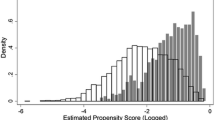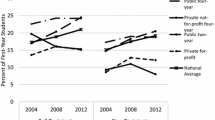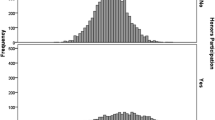Abstract
Placing students on academic probation is a pervasive practice at colleges and universities, but the lasting impact—and arguably even the purpose—of academic probation is unclear. The present study explored the influence of academic probation on four-year graduation using regression discontinuity analyses with a dataset of 9,777 undergraduates. The results frequently identified large or very large negative effects of probationary placement on four-year graduation, and these were greatest for probationary criteria based on either semester GPA or an overall GPA criterion in which students had accrued fewer than 30 total college credits. The findings were robust across analytic approaches and were observed regardless of students’ race, sex, first-generation status, high school GPA, and standardized test scores; the effects were sometimes larger among students who had higher high school GPAs and female students. Supplemental analyses suggest that the graduation effects based on cutoffs for college semester GPA and early overall GPA were predominantly or entirely driven by attrition that occurred soon after the probationary placement, whereas graduation effects based on the overall GPA cutoff with at least 30 college credits appeared to be driven mostly by delaying time to degree. These findings have critical implications for institutional policy and practice.


Similar content being viewed by others
References
Albert, A., & Wozny, N. (2019). The effect of academic probation on academic outcomes: Evidence from the U.S. Air Force Academy. Unpublished manuscript
American Academy of Arts & Sciences. (2017). The future of undergraduate education: The future of America. Cambridge, MA: Author
Angrist, J. D., & Pischke, J. S. (2015). Mastering ‘metrics: The path from cause to effect. Princeton, NJ: Princeton University Press
Arcand, I., & LeBlanc, R. N. (2012). When you fail, you feel like a failure”: One student’s experience of academic probation and an academic support program. Alberta Journal of Educational Research, 58(2), 216–231
Arnold, I. J. M. (2015). The effectiveness of academic dismissal policies in Dutch university education: An empirical investigation. Studies in Higher Education, 40(6), 1068–1084
Author (in press).
Barouch-Gilbert, A. (2015). Academic deficiency: Student experiences of institutional labeling. Journal of the First-Year Experience & Students in Transition, 27(2), 101–111
Bartalotti, O., & Brummet, Q. (2017). Regression discontinuity designs with clustered data. In M. D. Cattaneo, & J. C. Escanciano (Eds.), Regression discontinuity designs: Theory and practice (38 vol., pp. 383–420). New York, NY: Emerald. (Advances in Econometrics)
Bartkowiak, B. (2015, February 6). Does academic probation keep kids in college or push them out? Michigan Public Radio. Retrieved from https://stateofopportunity.michiganradio.org/post/does-academic-probation-keep-kids-college-or-push-them-out
Bean, J., & Eaton, S. (2000). A psychological model of college student retention. In J. M. Braxton (Ed.), Reworking the student departure puzzle (pp. 48–61). Vanderbilt University Press
Bowman, N. A., Jang, N., Kivlighan, D. M., III., Schneider, N., & Ye, X. (2020). The impact of a goal-setting intervention for engineering students on academic probation. Research in Higher Education, 61, 142–166
Bowman, N. A., Mohebali, M., & Jarratt, L. (2022). An interdisciplinary theory of college student success. In N. A. Bowman (Ed.), How college students succeed: Making meaning across disciplinary perspectives (pp. 238–272). Stylus
Brady, S. T., Fotuhi, O., Gomez, E., Cohen, G. L., Urstein, R., & Walton, G. M. (2019). A scarlet letter? Revising institutional messages about academic probation can mitigate students’ feelings of shame and stigma. Unpublished manuscript
Brady, S. T., Kroeper, K. M., Henderson, A. G., Li, X. A., Ozier, E., Blodorn, A. … Walton, G. M. (2017). Message intended is not message received: Shame, stigma, and disengagement in the academic probation notification process. Paper presented at the annual meeting of the Association for Public Policy Analysis & Management, Chicago, IL
Cabrera, A. F., Nora, A., & Castañeda, M. B. (1992). The role of finances in the persistence process: A structural model. Research in Higher Education, 33, 571–593
Calonico, S., Cattaneo, M. D., Farrell, M. H., & Titiunik, R. (2017). rdrobust: Software for regression-discontinuity designs. Stata Journal, 17, 372–404
Calonico, S., Cattaneo, M. D., & Titiunik, R. (2014). Robust data-driven inference in the regression-discontinuity design. Stata Journal, 14, 909–946
Casey, M. D., Cline, J., Ost, B., & Qureshi, J. A. (2018). Academic probation, student performance, and strategic course-taking. Economic Inquiry, 56(3), 1646–1677
Cattaneo, M. D., Idrobo, N., & Titiunik, R. (2020). A practical introduction to regression discontinuity designs: Foundations. New York, NY: Cambridge University Press
Cattaneo, M. D., Titiunik, R., & Vazquez-Bare, G. (2016). Inference in regression discontinuity design under local randomization. Stata Journal, 16(2), 331–367
Chi, O. L., & Dow, A. W. (2014). Improving balance in regression discontinuity design by matching: Estimating the effect of academic probation after the first year of college. Paper presented at the annual meeting of the Society for Research on Educational Effectiveness, Washington, DC
Cornelisz, I., van der Velden, R., de Wolf, I., & van Klaveren, C. (2020). The consequences of academic dismissal for academic success. Studies in Higher Education, 45(11), 2175–2189
Deke, J., & Dragoset, L. (2012). Statistical power for regression discontinuity designs in education: Empirical estimates of design effects relative to randomized controlled trials (Working Paper 8). Princeton, NJ: Mathematica Policy Research
Dong, Y. (2019). Regression discontinuity designs with sample selection. Journal of Business & Economic Statistics, 37(1), 171–186
Fletcher, J. M., & Tokmouline, M. (2017). The effects of academic probation on college success: Regression discontinuity evidence from four Texas universities (IZA DP No. 11232). Bonn, Germany: IZA—Institute of Labor Economics
Gopalan, M., Rosinger, K., & Ahn, J. B. (2020). Use of quasi-experimental research designs in education research: Growth, promise, and challenges. Review of Research in Education, 44(1), 218–243
Hwang, M. H., Lee, D., Lim, H. J., Seon, H. Y., Hutchison, B., & Pope, M. (2014). Academic underachievement and recovery: Student perspectives on effective career interventions. The Career Development Quarterly, 62(1), 81–94
Lee, D. W. (2008). Randomized experiments from non-random selection in U.S. House elections. Journal of Economics, 142, 675–697
Lee, M. J. (2016). Matching, regression discontinuity, difference in differences, and beyond. New York, NY: Oxford University Press
Lindo, J. M., Sanders, N. J., & Oreopoulos, P. (2010). Ability, gender, and performance standards: Evidence from academic probation. American Economic Journal: Applied Economics, 2(2), 95–117
Lousdal, M. L. (2018). An introduction to instrumental variable assumptions, validation and estimation. Emerging Themes in Epidemiology, 15(1), 1–7
Mattei, A., & Mealli, F. (2016). Regression discontinuity designs as local randomized experiments. Observational Studies, 2, 156–173
Mayhew, M. J., Rockenbach, A. N., Bowman, N. A., Seifert, T. A., Wolniak, G. C., with, Pascarella, E. T., & Terenzini, P. T. (2016). How college affects students (Vol. 3): 21st century evidence that higher education works. San Francisco, CA: Jossey-Bass
McCrary, J. (2008). Manipulation of the running variables in the regression discontinuity design: A density test. Journal of Econometrics, 142(2), 698–714
McKenzie, D. (2016a, September 6). Power calculations for regression discontinuity evaluations: Part 1. Retrieved from https://blogs.worldbank.org/impactevaluations/power-calculations-regression-discontinuity-evaluations-part-1
McKenzie, D. (2016b, September 8). Power calculations for regression discontinuity evaluations: Part 2. Retrieved from https://blogs.worldbank.org/impactevaluations/power-calculations-regression-discontinuity-evaluations-part-2
Molina, A., & Abelman, R. (2000). Style over substance in interventions for at-risk students: The impact of intrusiveness. NACADA Journal, 20(2), 5–15
Moody, J. (2019, April 2). What academic probation is and how to avoid it. U.S. News and World Report. Retrieved from https://www.usnews.com/education/best-colleges/articles/2019-04-02/what-academic-probation-is-and-how-to-avoid-it
Morisano, D., Hirsh, J. B., Peterson, J. B., Pihl, R. O., & Shore, B. M. (2010). Setting, elaborating, and reflecting on personal goals improves academic performance. Journal of Applied Psychology, 95(2), 255
Moss, B. G., & Yeaton, W. H. (2015). Failed warnings: Evaluating the impact of academic probation warning letters on student achievement. Evaluation Review, 39(5), 501–524
Mu, L., & Fosnacht, K. (2019). Effective advising: How academic advising influences student learning outcomes in different institutional contexts. Review of Higher Education, 42(4), 1283–1307
Museus, S. D. (2014). The culturally engaging campus environments (CECE) model: A new theory of success among racially diverse college student populations. In M. B. Paulsen (Ed.), Higher Education: Handbook of Theory and Research (29 vol., pp. 189–227). Springer
Nelson, V. (2019). Academic probation in college. CollegiateParent. Retrieved from https://www.collegiateparent.com/academics/academic-probation-in-college/
Nora, A. (2004). The role of habitus and cultural capital in choosing a college, transitioning from high school to higher education, and persisting in college among minority and nonminority students. Journal of Hispanic Higher Education, 3, 180–208
Ost, B., Pan, W., & Webber, D. (2016). The returns to college persistence for marginal students: Regression discontinuity evidence from university dismissal policies. Bonn, Germany: IZA – Institute of Labor Economics. IZA DP No. 9799
Pascarella, E. T., & Terenzini, P. T. (2005). How college affects students (Vol. 2): A third decade of research. Jossey-Bass
Schlossberg, N. K. (1984). Counseling adults in transition. Springer
Schlossberg, N. K. (1989). Overwhelmed: Coping with life’s ups and downs. Lexington Books
Schochet, P. Z. (2008). Technical methods report: Statistical power for regression discontinuity designs in education evaluations (NCEE 2008-4026). Washington, DC: National Center for Education Evaluation and Regional Assistance, U.S. Department of Education
Schochet, P. Z. (2009). Statistical power for regression discontinuity designs in education evaluations. Journal of Educational and Behavioral Statistics, 34(2), 238–266
Schudde, L., & Scott-Clayton, J. (2016). Pell grants and performance-based scholarships? An examination of satisfactory academic progress requirements in the nation’s largest need-based aid program. Research in Higher Education, 57(8), 943–967
Sekhon, J. S., & Titiunik, R. (2017). On interpreting the regression discontinuity design as a local experiment. In M. D. Cattaneo, & J. C. Escanciano (Eds.), Regression discontinuity designs: Theory and practice (38 vol., pp. 1–28). New York, NY: Emerald. (Advances in Econometrics
Sneyers, E., & De Witte, K. (2014). The influence of selection after the gate on graduation rates: Evidence from variation in the size of an academic dismissal policy. Unpublished manuscript
Sneyers, E., & De Witte, K. (2017). The effect of an academic dismissal policy on dropout, graduation rates and student satisfaction: Evidence from the Netherlands. Studies in Higher Education, 42(2), 354–389
Sneyers, E., & De Witte, K. (2018). Interventions in higher education and their effect on student success: A meta-analysis. Educational Review, 70(2), 208–228
Tinto, V. (1993). Leaving college: Rethinking the causes and cures of student attrition (2nd ed.). University of Chicago Press
Turner, L. J. (2014). The road to Pell is paved with good intentions: The economic incidence of federal student grant aid. Working paper, University of Maryland
Waltenbury, M., Brady, S., Gallo, M., Redmond, N., Draper, S., & Fricker, T. (2018). Academic probation: Evaluating the impact of academic standing notification letters on students. Toronto, ON: Higher Education Quality Council of Ontario
Williams, H. E., & Murphy, M. C. (2022). Social psychological approaches to college student success. In N. A. Bowman (Ed.), How college students succeed: Making meaning across disciplinary perspectives (pp. 116–146). Stylus
Wright, N. A. (2020). Perform better, or else: Academic probation, public praise, and students decision-making. Labour Economics, 62, 101773
Yeager, D. S., & Walton, G. M. (2011). Social-psychological interventions in education: They’re not magic. Review of Educational Research, 81, 267–301
Yeaton, W. H., & Moss, B. G. (2020). A multiple-design, experimental strategy: Academic probation warning letter’s impact on student achievement. Journal of Experimental Education, 88(1), 123–144
Author information
Authors and Affiliations
Corresponding author
Additional information
Publisher’s Note
Springer Nature remains neutral with regard to jurisdictional claims in published maps and institutional affiliations.
The authors thank the faculty and graduate researchers in the Center for Research on Undergraduate Education for their helpful insights on an earlier version of this project.
Appendix: Descriptive Statistics for all Variables
Appendix: Descriptive Statistics for all Variables
Variable | Mean | SD | Minimum | Maximum |
|---|---|---|---|---|
Four-year graduation | 0.61 | 0.49 | 0 | 1 |
Academic probation | 0.08 | 0.28 | 0 | 1 |
Semester college GPA | 2.92 | 0.82 | 0 | 4.33 |
Overall college GPA | 2.91 | 0.65 | 0 | 4.33 |
Female | 0.57 | 0.49 | 0 | 1 |
Student of Color | 0.34 | 0.47 | 0 | 1 |
First-generation student | 0.30 | 0.46 | 0 | 1 |
Higher ACT composite score | 0.49 | 0.50 | 0 | 1 |
Higher high school GPA | 0.50 | 0.50 | 0 | 1 |
Rights and permissions
About this article
Cite this article
Bowman, N.A., Jang, N. What is the Purpose of Academic Probation? Its Substantial Negative Effects on Four-Year Graduation. Res High Educ 63, 1285–1311 (2022). https://doi.org/10.1007/s11162-022-09676-w
Received:
Revised:
Accepted:
Published:
Issue Date:
DOI: https://doi.org/10.1007/s11162-022-09676-w




